commentary Commentary
Commentary: Why doesn’t recycling rope in the karang guni?
Singapore’s National Recycling Programme could be boosted if our rag-a-bone men were given a new lease of life as employed ambassadors, says Kavickumar Muruganathan.
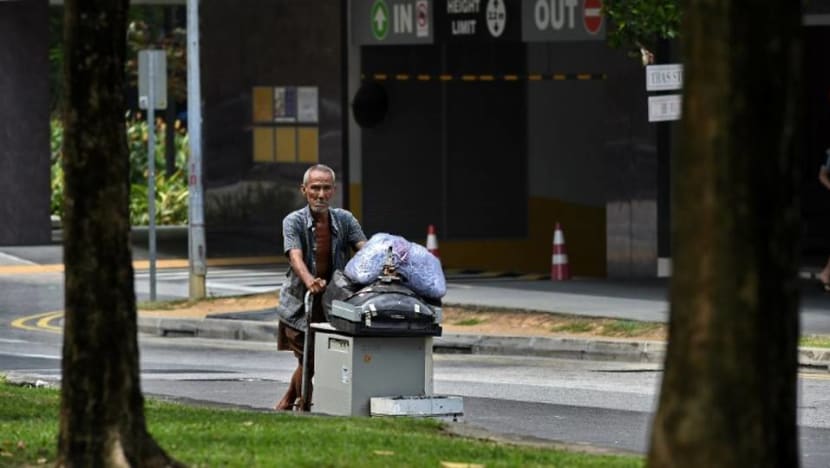
A karang guni, or rag-and-bone man, pushes a trolley loaded with scrap materials on a street in Singapore. (Photo: AFP/Roslan Rahman)
SINGAPORE: On Saturday (Apr 27), Nee Soon East, led by Member of Parliament Louis Ng, pledged to eliminate the use of plastic disposables from meetings and events over the next two years.
The community also announced a range of efforts to curb waste as part of its newly launched zero-waste master plan, including innovative ways for residents to communicate with each other when they have excess food to give away through the use of Telegram.
Such local efforts to reduce waste ought to be commended. Unfortunately, recycling woes continue to plague Singapore in its designated year of climate change action.
Despite efforts to improve awareness, our overall recycling rate dipped slightly from 61 per cent in 2017 to 60 per cent in 2018, according to statistics from the National Environment Agency (NEA).
While the household recycling rate increased marginally from 21 per cent in 2017 to 22 per cent in 2018, these numbers need to show a significant improvement for Singapore to meet its 30 per cent recycling rate target by 2030.
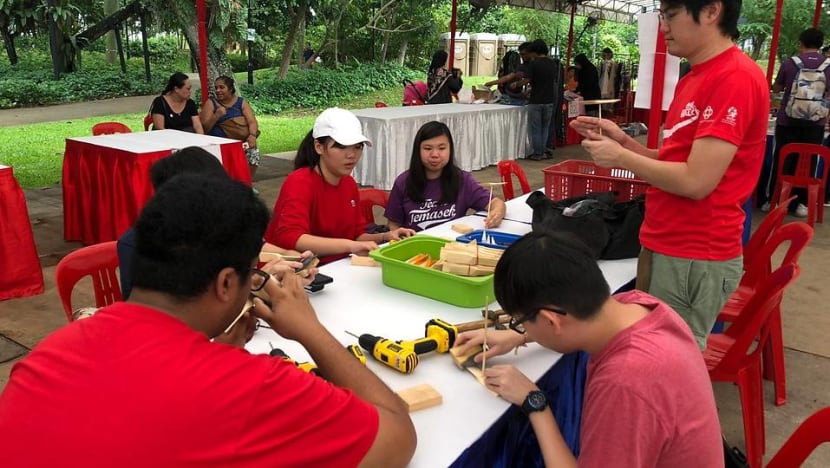
READ: Recycling makes you feel less guilty but doesn’t change how huge our plastic problem is, a commentary
WHAT HAPPENED TO THE NATIONAL RECYCLING PROGRAMME?
This calls into question the effectiveness of the National Recycling Programme, which has seen recycling bags and bins given to residents in estates since 2001, and a blue recycling bin placed in every HDB block since 2014.
In 2018, 43,400 tonnes of recyclables were collected while 7.7 million tonnes of waste was generated.
This is lower than the total amount of recyclables collected in 2017 (44,400 tonnes) and 2016 (44,200 tonnes).
The national recycling effort collected just 2 per cent of the total amount of waste generated by households in 2016.
The informal recycling sector which consists of rag-and-bone men (or karang guni men) collected almost nine times more; close to 20 per cent of recyclables.
No doubt NEA’s efforts to fit new public housing developments and non-landed private residential developments with individual household chutes for recyclables from April 2018 onwards could make recycling more convenient.
NEA had also previously highlighted that the NRP was supposed to complement efforts by the informal recycling sector but there are synergies to be exploited if Singapore’s national efforts consider and strengthen the latter’s role.
CALL IN THE KARUNG GUNI
The karung guni’s high-touch approach ensures they reach most households. They collect all forms of recyclables and items that can be given a second lease of life, including electronics that can be sold to dealers, along with recyclable waste that will go to waste recycling companies.
Their knowledge about what cannot be recycled (such as plastic disposables) and what can be (for example, detergent bottles and objects marked with the recycling triangle that have been washed and dried) can help households separate their waste.
This can make a huge difference considering seven in 10 in Singapore do not know what plastics to recycle, according to the Singapore Environment Council.
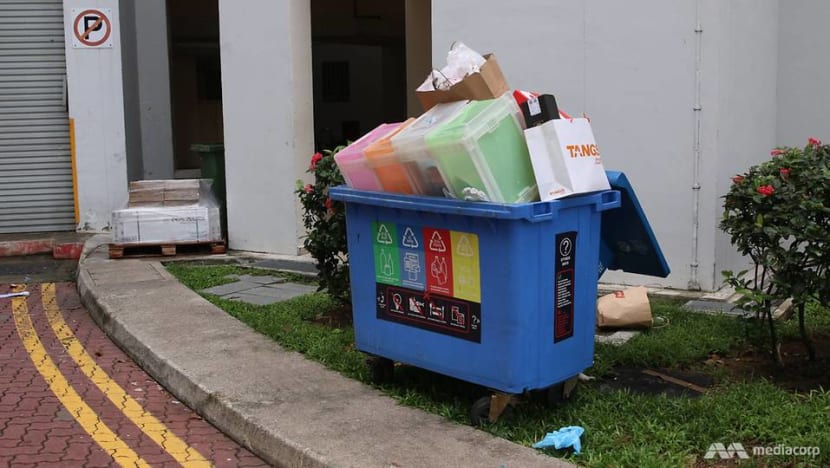
Singapore’s Zero Waste Masterplan, which aims to raise awareness of waste issues and the need to conserve resources, and is due to be released later this year, has got to factor in this group, which has been a crucial but a very much overlooked component of Singapore’s informal waste economy.
Public waste collectors (PWCs) like Veolia issue commingled recycling bins. This amplifies contamination rates especially if non-recyclable waste is commingled with recyclable waste.
A recent survey of 5,000 households by the Ministry of Environment & Water Resources (MEWR) and NEA indicated a significant proportion of respondents mistook items that should be disposed of, such as tissue paper, styrofoam and soiled paper food packaging, as recyclables.
Clearly more needs to be done to help Singaporeans identify items that should not be thrown into a recycling bin.
READ: Why recycling, less single-use plastics are not the answers to our plastic scourge, a commentary
In contrast, the karung guni men’s expertise in the sorting of non-recyclables from recyclables is crucial in preventing cross contamination from taking root, which currently accounts for 40 per cent of contents in recycling bins not being recycled.
While they may not be the most tech-savvy group, they possess strong knowledge on the fundamentals of effective recycling and can be mobilised to educate residents, as well as to collect and deliver recyclables to recycling facilities.
They remain the earliest proponents of a recycling culture in Singapore, with Singaporeans truly accustomed to their audible loud horns and metallic push carts in many housing estates.
It would be useful to see how karung guni men can be enlisted to aid such community-driven recycling efforts, like Mr Ng’s, as employed ambassadors.
READ: Charging for carrier bags one way to rid Singapore of 'throwaway culture': Louis Ng
HOW TO GET RECYCLING TO GO BIG
Their potential impact must not be underestimated.
Global statistics show that an informal waste collector collects about 49kg of recyclables each day, spending anywhere between 6 to 12 hours and clocking between 6 to 25 km on foot or bicycle on average. This works out to 12 tonnes per year of recyclables collected by each one.
An informal sector comprising of 5,000 individuals can easily collect 60,000 tonnes of recyclables annually, more than the amount collected under Singapore’s National Recycling Programme in each of the last two years.
In Karachi, the informal sector recycles 45 per cent of total waste generated. Closer to home in the Philippines city of Quezon, 31 per cent of total waste generated is recycled by the informal sector.
It is encouraging to know that corporates at home have begun to take the lead in engaging the informal sector in recycling efforts. Popular alcohol beverage brand Tiger Beer recently forged a partnership with them to encourage Singaporeans to recycle in the lead up to Chinese New Year.
The Recycle With Tiger campaign saw the brand’s staff go from door-to-door with a group of karang guni men to collect recyclables. While this marks a good start, such efforts could be scaled up to make a dent on the national recycling rate.
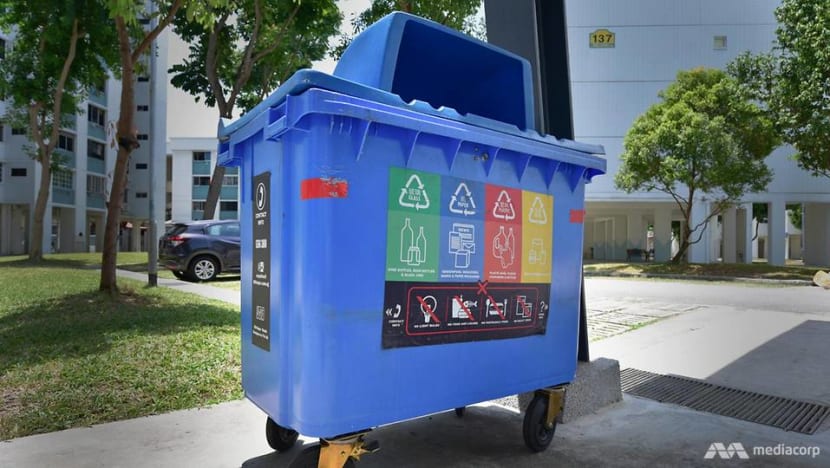
A DATABASE OF INFORMAL RECYCLERS
A database of informal recyclers in Singapore could be established. Data on informal sector waste management performance can aid with policy-making and advocacy where they provide some visibility over these informal systems and their effectiveness.
Brazil, the only nation that systematically captures and reports official statistical data on waste pickers, has information on over 229,000 waste collectors responsible for the high rates of recycling. Nearly 92 per cent of aluminium and 80 per cent of cardboard are recycled each year there.
Even before a formal database is established, given their recognised effectiveness, NEA could tie some credible ones up with PWCs to establish direct contracts for recyclables at a reasonable rate.
Mr Ng’s efforts to fast-track Nee Soon East’s efforts to take a step forward in saving the planet could consider a pilot.
Apart from ensuring a stable income for these recyclers, such efforts may potentially draw more to join this otherwise sunset sector that ought to be given a boost considering how much climate change action is needed.
READ: Dear Singapore, a plastic future is not fantastic, a commentary
In an increasing number of cities, informal waste collectors have been included in municipal planning around waste management. In countries such as Brazil, Colombia and India, informal waste collectors now bid for contracts within certain municipalities.
Surely Mr Ng’s Nee Soon East district could be a test-bed for others to observe.
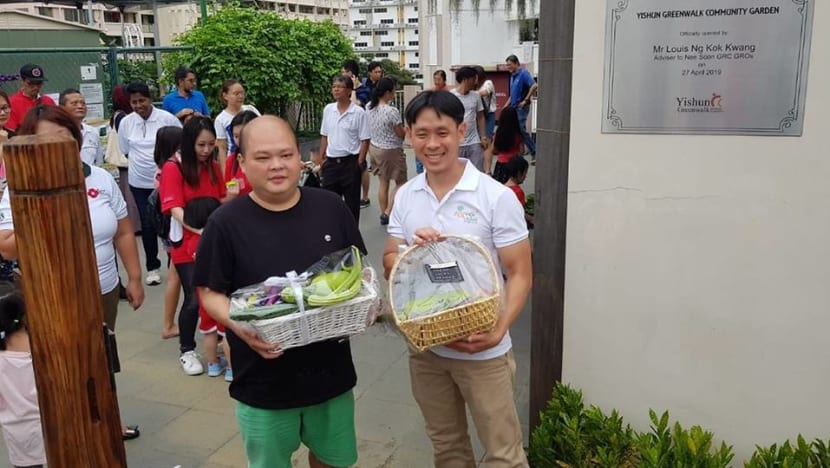
HOW TO BUILD A CIRCULAR ECONOMY
“Circular economy” has been a term gaining traction in Singapore’s push towards a zero-waste nation, since the setting up of a Circular Economy Taskforce at NUS which draws members from agencies such as A*STAR.
Informal waste collectors have a key role to play in this vision.
The Circular Economy Taskforce must actively engage this sector and define their role in the national effort to circularise our economy, on top of their focus on technology to do the job. Any consultation and focus group sessions should include them.
A concerted effort that recognises the informal recycling sector as a core pillar is required to realistically chart Singapore’s journey towards meeting its 2030 recycling rate targets and give it arms and legs to boost efforts.
It is about time that we appreciate and pay tribute to our unsung heroes in our national waste management system and climate change efforts.
Kavickumar Muruganathan is Deputy Director of Sustainability at HeveaConnect, a digital platform for the trade of sustainable natural rubber.














